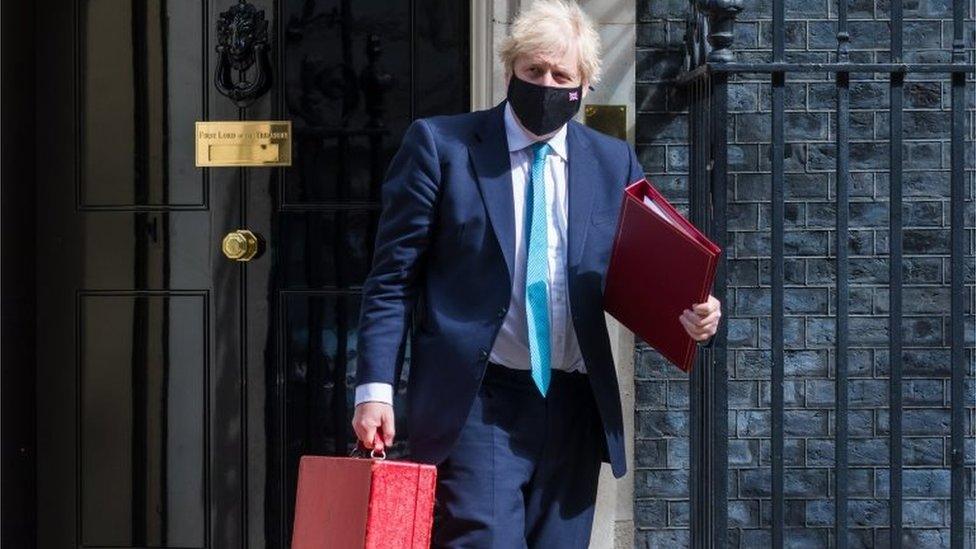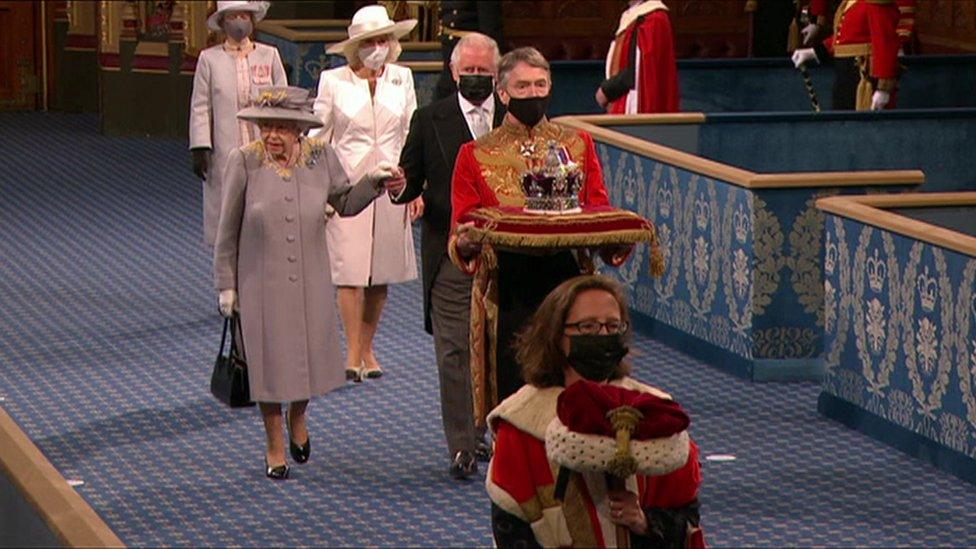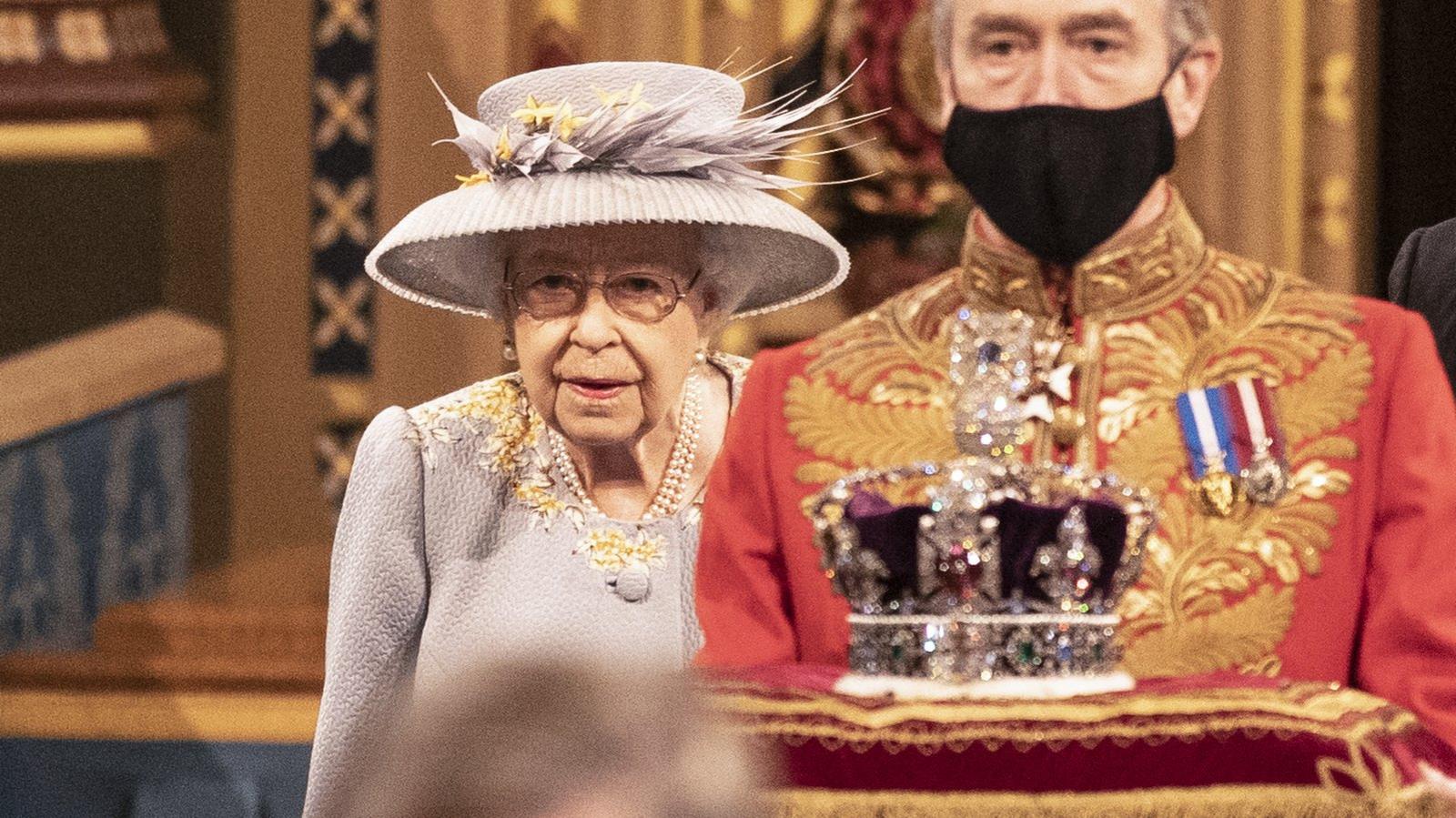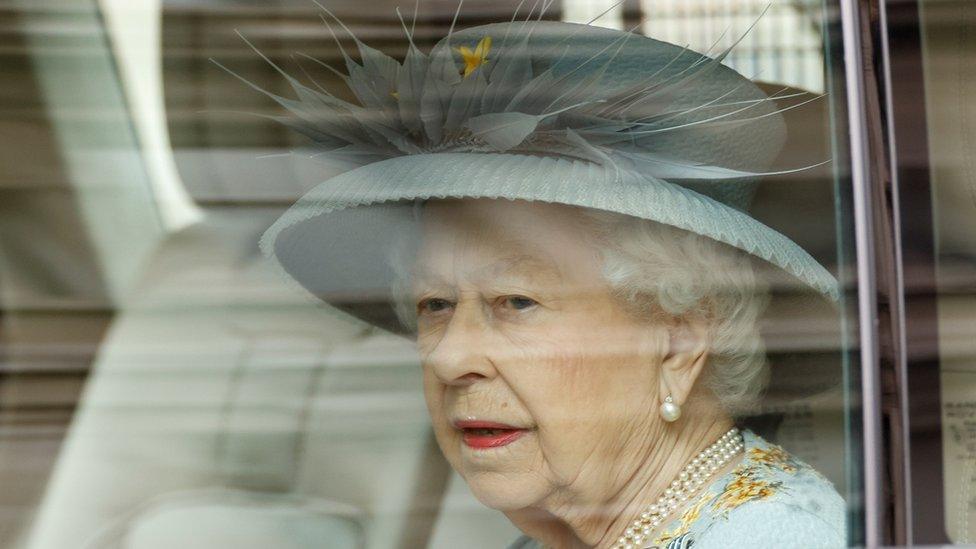Queen's Speech: Boris Johnson promises post-Covid skills overhaul
- Published

Boris Johnson is promising a skills "revolution" for England, with loans for adults wanting to retrain and more powers to deal with failing colleges.
The measures are being unveiled in the Queen's Speech, which sets out the government's programme for the next year.
It includes 30 bills with pledges to overhaul the asylum system and reform planning laws in England.
MPs are set to debate the proposed new laws this afternoon.
The Queen's Speech is part of the State Opening of Parliament, normally the grandest of Westminster occasions.
But it was pared back this year because of Covid, with fewer MPs and peers than normal gathering in the House of Lords to hear it - and the Queen arriving by car rather than the usual carriage.
It is the monarch's first major public engagement since the death of her husband, the Duke of Edinburgh.
Labour has called for detailed plans to fix the "broken" social care system.
Health Secretary Matt Hancock said the government would "bring forward a long-term plan to strengthen and reform social care".
The government says its main focus is on helping the country recover from the pandemic, after the economy shrank by 9.9% last year., and spreading opportunity more evenly across the UK.
A range of bills will aim to help industrial and post-industrial areas in particular, where the Conservatives have been picking up support recently.
The speech, written by ministers but delivered by the monarch, will promise to bring in a "lifetime skills guarantee".
Part of this will be allowing all adults to get a "flexible loan" for higher-level education and training at university or college, "useable at any point in their lives".
This will be used to provide the equivalent of up to four years' study and can be used for full-time or part-time courses.
Businesses and trainers will be encouraged to target "local needs in sectors including construction, digital, clean energy and manufacturing".
Labour's shadow foreign secretary Lisa Nandy said the government had "lots of talk but little action" about levelling up and creating jobs.
She said: "It's great to hear that they want people to be able to retrain, but where are the jobs that people need...the good-quality jobs that allow people to earn decent money to look after their families, and to be able to spend in their local communities and on their high streets?"
'Outdated notion'
Ahead of the speech, the prime minister said: "These new laws are the rocket fuel that we need to level up this country and ensure equal opportunities for all. We know that having the right skills and training is the route to better, well-paid jobs.
"I'm revolutionising the system so we can move past the outdated notion that there is only one route up the career ladder, and ensure that everyone has the opportunity to retrain or upskill at any point in their lives."

The government will introduce the Skills and Post-16 Education Bill - detailing the plans - next week.
The Queen's Speech will include 30 pieces of legislation, although several of them are carried over from the previous session.
Labour and local government leaders have demanded detailed plans for the reform of social care.
Former health secretary Jeremy Hunt said there was a "live debate" going on inside No 10 and the Treasury and tensions over the costs of changing the system, including introducing a cap on people's care costs.
But the Conservative chair of the Commons Health and Social Care Committee added that "this is not about the immediate problem in public finances caused by pandemic because the costs will build up later" and said the government needed to come up with "a comprehensive solution".
Mr Hancock said strengthening the social care system was "close to the prime minister's heart" but the pandemic had meant the government "weren't able to put as much focus on [plans] as we would have done".
On his first day as prime minister Boris Johnson made a promise to "fix social care" and shadow health secretary Jonathan Ashworth has told the Daily Mirror, external that the Queen's Speech would be a test as to whether he "delivers on his word".
Labour leader Sir Keir Starmer said: "We must also see detail on long-promised plans to fix the broken social care system, reduce the shocking levels of violent crime and narrow the gap between different parts of the country.
"For 11 years we have had lots of rhetoric and the endless promise of jam tomorrow. That must now be turned to action."
Conversion therapy ban consultation
This year's speech will also include changes to the policing of protests, including setting time and noise limits. A previous discussion of this by MPs earlier this year led to angry demonstrations.
Critics say the measures impose disproportionate controls on free expression and the right to protest - but ministers say the proposals will respect human rights and will only affect very disruptive gatherings.
The speech is expected to include a bill restricting the future prosecution of British soldiers who served in Northern Ireland during the Troubles.
And there is likely to be a Sovereign Borders Bill, aimed at dissuading asylum seekers from crossing the English Channel.
A ban on so-called conversion therapy - attempts to change someone's sexual orientation or gender identity - is proposed too. This will be preceded by a public consultation, the BBC understands.
The speech will include a commitment to introducing voter ID for future general elections, which has raised concerns among many MPs and civil rights groups.
Legally binding environmental targets are also expected to feature, as is a planning bill to ease controls in England and increase housebuilding.
Many Conservative MPs are concerned this legislation will leave people in some areas with less say over new developments.
National Trust director general Hilary McGrady has warned the prime minister over plans to drive development of homes, saying that "the stakes are high and reforms need to be carefully considered".
Writing in the Daily Telegraph, external she said: "The planning system is the most important tool that we have for shaping our physical environment.
"It is a mistake to characterise it as simply a blocker to new homes, growth and development in general."


Related topics
- Published11 May 2021

- Published10 May 2021

- Published11 May 2021
